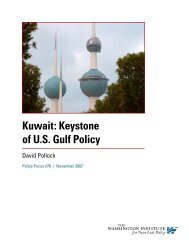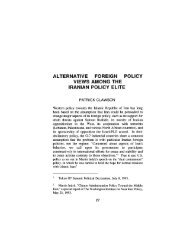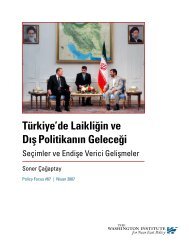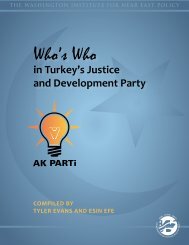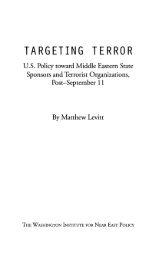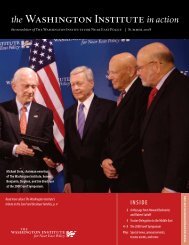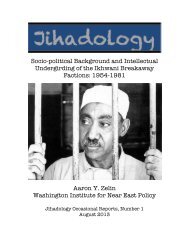Michael Eisenstadt David Pollock How the United States Benefits ...
Michael Eisenstadt David Pollock How the United States Benefits ...
Michael Eisenstadt David Pollock How the United States Benefits ...
You also want an ePaper? Increase the reach of your titles
YUMPU automatically turns print PDFs into web optimized ePapers that Google loves.
1 | Introduction<br />
THE U.S.-ISRAEL special relationship has traditionally<br />
been defined in terms of a moral obligation,<br />
shared cultural and political values, and common<br />
interests. 1 During <strong>the</strong> Cold War, in <strong>the</strong> context<br />
of <strong>the</strong> geopolitical struggle with <strong>the</strong> Soviet Union,<br />
Israel also came to be seen as a strategic asset. It<br />
served as a bulwark against Soviet influence, defeating<br />
Soviet allies in 1967, 1969–1970, 1973, and again<br />
in 1982, victories that were a blow to Soviet prestige<br />
and a vindication for U.S. arms. And it served as a<br />
counter to radical Arab nationalism—tipping off<br />
<strong>the</strong> moderate leaders of Jordan, Egypt, and Saudi<br />
Arabia regarding coup plots and assassinations<br />
and working with <strong>the</strong> <strong>United</strong> <strong>States</strong> to turn back<br />
a Syrian invasion of Jordan in 1970. 2 U.S. military<br />
support for Israel and U.S.-Israel security cooperation<br />
contributed to peace treaties with Egypt and<br />
Jordan and, since 1982, have deterred <strong>the</strong> outbreak<br />
of a major interstate conflict involving Israel and<br />
its neighbors—while U.S. munitions and military<br />
equipment stockpiled in Israel have been available<br />
for use by <strong>the</strong> <strong>United</strong> <strong>States</strong> (and Israel) for various<br />
regional contingencies. 3 Finally—and somewhat<br />
counterintuitively—<strong>the</strong> U.S.-Israel special relationship<br />
helped spur closer U.S.-Arab ties following<br />
<strong>the</strong> 1973 war, because many Arabs believed that<br />
only Washington could deliver <strong>the</strong> Israeli concessions<br />
that <strong>the</strong>y required for peace. 4<br />
Since <strong>the</strong> end of <strong>the</strong> Cold War, however, <strong>the</strong><br />
<strong>United</strong> <strong>States</strong> and Israel have often preferred not<br />
to publicly discuss <strong>the</strong> details of <strong>the</strong>ir security relationship,<br />
lest it draw unwanted attention and complicate<br />
U.S. efforts to work with Arab and Muslim<br />
allies, first to contain Saddam Hussein’s Iraq and<br />
later to defeat al-Qaeda. As a result, many of <strong>the</strong><br />
benefits of U.S.-Israel security cooperation have<br />
gone unrecognized, making it easier for critics to<br />
portray Israel as a strategic liability. 5 Although this<br />
view has not gained broad currency in <strong>the</strong> U.S. government,<br />
it has, in recent years, garnered support in<br />
some media, academic, and policy advocacy circles.<br />
O<strong>the</strong>r critics see U.S.-Israel relations primarily, if<br />
not exclusively, through <strong>the</strong> prism of <strong>the</strong> Israeli-<br />
Palestinian peace process, ignoring or neglecting<br />
<strong>the</strong> many ways that <strong>the</strong> <strong>United</strong> <strong>States</strong> benefits from<br />
<strong>the</strong> relationship.<br />
A decade after 9/11, al-Qaeda is a fragmented,<br />
weakened organization. And while <strong>the</strong> war on al-<br />
Qaeda and its affiliates is far from over, <strong>the</strong> <strong>United</strong><br />
<strong>States</strong> faces a changed, more complex global security<br />
environment, defined not only by <strong>the</strong> hard<br />
security challenges posed by terrorism and conventional/hybrid<br />
military threats, but also by new and<br />
emerging soft security challenges. 6<br />
Israel possesses highly professional intelligence<br />
services and counterterrorism forces, and has pioneered<br />
many of <strong>the</strong> technologies and concepts<br />
that are transforming <strong>the</strong> face of modern warfare,<br />
including unmanned vehicles/robotics, rocket<br />
and missile defenses, intelligence, surveillance,<br />
and reconnaissance systems, passive and active<br />
defenses for armored vehicles, and cyberwarfare.<br />
It thus remains an important partner in efforts to<br />
deal with <strong>the</strong> hard security challenges of <strong>the</strong> future<br />
and in preserving <strong>the</strong> competitiveness of <strong>the</strong> U.S.<br />
defense-industrial base—through joint development<br />
efforts or <strong>the</strong> coproduction of cutting-edge<br />
Israeli systems. Just as important, Israel is well<br />
positioned to contribute to U.S. efforts to deal with<br />
emerging soft security challenges related to economic<br />
competitiveness, <strong>the</strong> information technology<br />
revolution, sustainability (i.e., water and food<br />
security, and <strong>the</strong> quest for energy alternatives), and<br />
public health, which will test U.S. resilience and<br />
require broad international cooperation if <strong>the</strong>y<br />
are to be solved. And while this is not a relationship<br />
of equals—<strong>the</strong> <strong>United</strong> <strong>States</strong> clearly provides<br />
a great deal more to Israel than it receives—it is<br />
a relationship that benefits both countries and<br />
that has intrinsic value above and beyond moral<br />
The WashingTon insTiTuTe for near easT Policy 1



